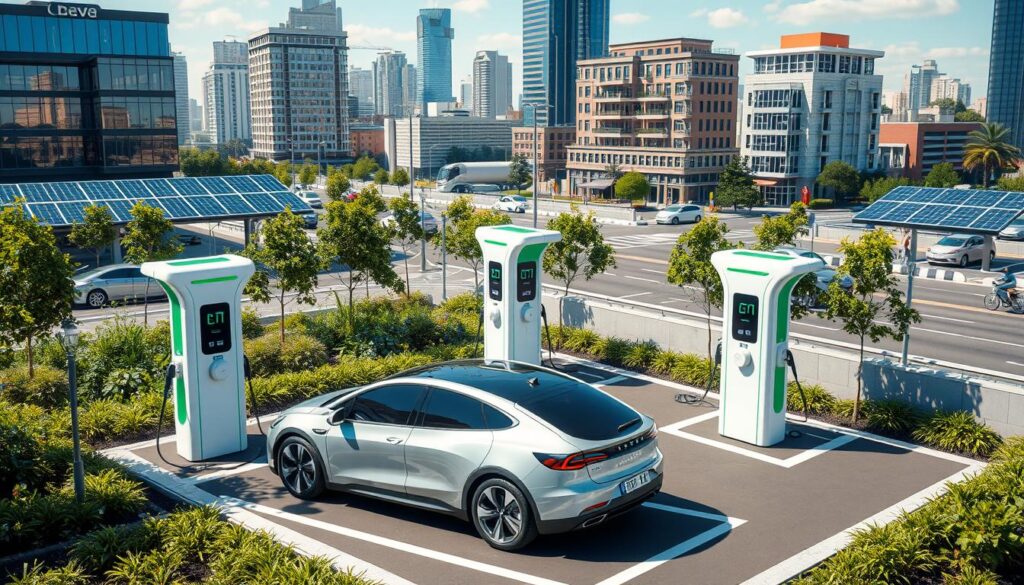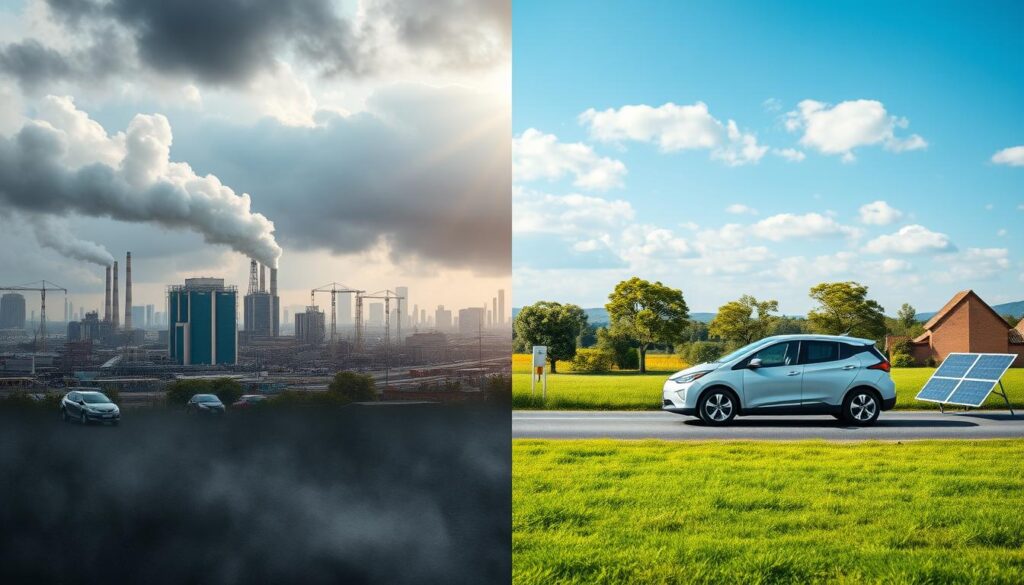The world is facing big challenges, and choosing between gas and electric cars is key. This choice affects not just you but the planet’s future. We’ll look closely at the differences between gas and electric cars, their effects on the environment, and their costs.
In This Guide
Understanding the Fundamentals of Gas vs Electric Car Impact
To understand the difference between gas and electric cars, we need to look at their mechanics and energy use. Knowing these differences helps you choose the right car for you.
Key Differences Between Internal Combustion and Electric Motors
Gas cars use an engine that burns gasoline to move. Electric cars use motors that run on electricity. This is the main difference between them.
Basic Operating Principles and Energy Conversion
Gas cars turn fuel into motion through explosions. Electric cars turn electricity into motion directly. This makes electric cars more efficient.
Power Generation and Delivery Systems
Gas cars have a complex system to move power to the wheels. Electric cars have a simpler system, with power going straight to the wheels. This makes electric cars more efficient and quick to respond.
Knowing these basics helps you see how gas and electric cars affect things like fuel use and the environment. This knowledge is key as we move towards more sustainable transportation options.
Environmental Impact of Traditional Gas-Powered Vehicles
The environmental impact of traditional gas-powered vehicles is a big concern. They cause air pollution, greenhouse gas emissions, and use up non-renewable fossil fuels. These effects harm our planet in many ways.
Gas-powered cars have a big carbon footprint. Burning gasoline in their engines releases a lot of carbon dioxide (CO2) into the air. This is a major cause of climate change. The transportation sector, especially cars, is a big source of greenhouse gas emissions.
| Emission Type | Gas-Powered Vehicles | Electric Vehicles |
|---|---|---|
| Carbon Dioxide (CO2) | High | Low (depends on electricity source) |
| Nitrogen Oxides (NOx) | High | Low |
| Particulate Matter (PM) | High | Low |
Gas-powered vehicles also release harmful pollutants like nitrogen oxides (NOx) and particulate matter (PM). These pollutants can harm air quality and human health. They can cause smog, respiratory problems, and other environmental issues.
Using non-renewable fossil fuels like gasoline and diesel is another big problem. As these resources get scarcer and harder to extract, the sustainability of gas-powered vehicles is questioned. We need to move towards sustainable and renewable energy sources for transportation.
The environmental impact of gas-powered vehicles is complex and involves many factors. As we aim for a sustainable future, moving to eco-friendly options like electric vehicles is key. This shift is important for our planet’s health.
Electric Vehicles and Their Carbon Footprint
The world is working hard to be more environmentally friendly. Electric vehicles (EVs) are getting a lot of attention because they might help cut down on carbon emissions. But, we need to look at how they affect the environment from start to finish.
Manufacturing Emissions and Battery Production
Making electric vehicles, especially the batteries, can release a lot of carbon. The process of mining, refining, and putting together battery parts uses a lot of energy. This makes EVs have a bigger environmental impact. But, car makers are trying to make their production lines more efficient to lower these carbon emissions.
Lifetime Environmental Impact Assessment
It’s important to think about how EVs affect the environment over their whole life. EVs don’t directly pollute while they’re being driven. But, how clean they are depends on the electricity they use to charge. In places that use a lot of clean energy sources, EVs are much better for the planet than cars that run on gasoline.
End-of-Life Recycling Considerations
- As more people start using electric vehicles, figuring out how to recycle them properly is getting harder.
- Car makers and government officials are trying to find ways to recycle EV parts, especially batteries, efficiently. This can help use materials again and lessen the environmental harm of getting rid of EVs.
- Handling EVs responsibly when they’re no longer needed can help us move towards a more circular economy. This means we use fewer natural resources that are running out.
In summary, the environmental effect of electric vehicles is a big topic that needs a complete look. By understanding the problems and chances in making, using, and recycling EVs, we can make better choices. This will help us support the long-term environmental sustainability of electric cars.
Comparing Energy Source Dependencies
Choosing between gas-powered and electric cars is more than just the motor type. It’s about the energy sources they use. Knowing these sources helps us see the impact and future of each car type.
Gasoline cars use fossil fuels, mainly crude oil. This oil is extracted, refined, and distributed before we can use it. This whole process uses a lot of energy and harms the environment. On the other hand, electric cars get their power from the grid. This grid can use many energy sources, including clean ones like solar and wind.
Using renewable energy sources for electric cars could make them much better. As the grid gets cleaner, electric cars’ carbon footprint drops. This makes them a great choice for those who care about the planet.
| Energy Source | Gas-Powered Cars | Electric Cars |
|---|---|---|
| Fossil Fuels | High Dependency | Low Dependency |
| Renewable Energy | Low Dependency | High Potential |
| Environmental Impact | Significant Emissions | Reduced Emissions |
The table shows how gas and electric cars differ in energy use. As the grid gets cleaner, electric cars will be better for the planet. They will use less fossil fuel, leading to a greener future for driving.
Operating Costs and Economic Considerations
Thinking about the money side of gas versus electric cars is important. Costs like fuel, electricity, maintenance, and insurance add up. Knowing these can help you choose what fits your budget and lifestyle.
Fuel vs Electricity Pricing
Gas prices change a lot, but electricity rates stay steady. This makes electric cars cheaper to run, especially with off-peak charging. Over time, you can save a lot on fuel efficiency with an electric car.
Maintenance Requirements and Expenses
Electric cars need less upkeep than gas cars. They have fewer parts, so they last longer. Plus, they use regenerative braking, which helps brakes last longer. They also need less fluid, which saves money on operating costs.
Insurance and Depreciation Factors
Electric cars might cost a bit more for insurance because of their advanced tech. But, they hold their value better than gas cars. This means they don’t lose value as quickly.
| Cost Factor | Gas Vehicle | Electric Vehicle |
|---|---|---|
| Fuel Costs | $2.50 per gallon | $0.12 per kWh |
| Maintenance Costs | $1,200 per year | $600 per year |
| Insurance Premiums | $1,500 per year | $1,800 per year |
| Depreciation Rate | 25% per year | 15% per year |
Looking at the operating costs and economic factors of gas and electric cars helps you make a smart choice. It’s about what works best for your money and travel plans.
Infrastructure Requirements and Accessibility
The choice between gas and electric cars depends a lot on the infrastructure. Gas cars have many gas stations, but electric cars need more charging spots. This is a big challenge for electric cars.
In the U.S., there are over 130,000 public charging spots. But, not all areas have easy access to these spots. This makes it hard for people to choose electric cars.
- Most EV charging happens at home, where people can install chargers.
- Public charging spots are key for long trips and those without home charging.
- More charging spots are needed for electric cars to become common.
Groups like governments and energy companies are trying to fix this problem. They’re adding more charging spots, especially in places that need them most. This includes spots at work, shopping areas, and highways.

The debate over gas vs. electric cars will keep going. But, how easy it is to charge electric cars will really matter. It will help decide if electric cars become more popular and if our transportation is more green.
Performance and Efficiency Metrics
Choosing between a gas-powered or electric vehicle involves looking at performance and efficiency. These aspects affect your daily driving and long-term costs. Let’s explore what matters most.
Range and Refueling/Charging Times
Range is key, as it shows how far you can go on one tank or charge. Gas cars can travel longer on a tank, great for long trips. But, electric cars are getting better, with some going over 300 miles on one charge.
How long it takes to refuel or recharge is also important. Gas cars refuel quickly, in just a few minutes. Electric cars take hours to charge, but fast charging stations are helping close this gap. Still, gas refueling is often quicker and more convenient.
Power Output and Acceleration
Power and acceleration are crucial for both fuel use and driving feel. Gas cars have more power for faster starts and better high-speed performance. Electric cars, though, offer instant torque for a smooth, quick start, especially at low speeds.
| Metric | Gas-Powered Vehicles | Electric Vehicles |
|---|---|---|
| Range | Longer per tank | Improving with battery technology |
| Refueling/Charging Time | Faster refueling | Longer charging times, but rapid charging options available |
| Power Output | Higher peak power | Instant torque delivery |
| Acceleration | Strong acceleration at higher speeds | Impressive acceleration at lower speeds |
The choice between a gas or electric car depends on your driving habits and needs. Knowing about performance and efficiency helps you pick the right car for you. This ensures a great driving experience.
Long-term Sustainability and Resource Management
The world is facing a big challenge with environmental sustainability. We need to think about the future of how we get around. Gas-powered and electric vehicles are two main options, and their impact on the planet is key.
Energy sources and how we manage them are crucial for both gas and electric cars. Gas cars use fossil fuels, which are running out and harm the environment. On the other hand, electric cars depend on the environmental sustainability of their energy sources.
- Renewable energy like solar and wind can make electric cars greener.
- Better battery production can also help electric cars last longer.
- Recycling batteries and parts can reduce waste and harm to the environment.
As technology improves, we might see changes in how gas and electric cars affect the planet. It’s important for everyone to think about these issues. This way, we can choose the best option for a greener future.
“The future of transportation lies in the careful management of our resources and the continued innovation in energy technology.” – Dr. Sarah Lemon, Sustainability Researcher

Making the Right Choice for Your Lifestyle
Choosing between a gas-powered and an electric vehicle depends on your daily habits and where you live. Think about your daily drive, long trips, and if you can find charging stations nearby. These factors help decide which car is best for you.
Personal Usage Patterns
For city driving with lots of stops, an electric car might be perfect. They start quickly and use energy well in traffic. But, if you drive long distances or tow heavy things, a gas car might be better. They have more range and power for tough tasks.
Climate and Geographic Considerations
The weather and where you live also matter. Extreme temperatures can hurt an electric car’s performance and range. Gas cars do better in such weather. Also, having charging stations nearby is key for electric cars.

